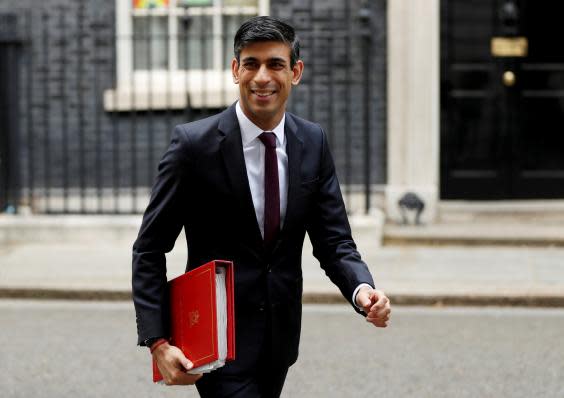Coronavirus: Rishi Sunak must extend furlough arrangements in areas like Leicester with local lockdowns, Labour urges

Chancellor Rishi Sunak must extend furlough arrangements in areas like Leicester which are forced into local lockdowns and offer targeted support for businesses and sectors threatened with mass redundancies as his job retention scheme winds down, Labour has said.
In a speech in London on Friday, shadow chancellor Anneliese Dodds will accuse the government of delivering “an exit without a strategy” from the £60 billion package of support for business offered during the coronavirus pandemic.
She will say that Mr Sunak must present a “back-to-work budget focused on jobs, jobs, jobs” in his emergency economic statement next week, telling the chancellor that for workers forced to stay home by government lockdown rules “the reward for months of sacrifice cannot be a redundancy notice”.
Meanwhile, a pair of think tanks put forward a £3.2 billion package of support for training and career changes which they said the chancellor could use to fend off “the most severe employment challenge since the Great Depression”.
Mr Sunak’s statement will come in the wake of a slew of high-profile announcements of job losses, including 5,000 at the company behind Upper Crust snack bars, 2,000 at the Royal Mail, 1,900 at Easyjet and 600 at shirt maker TM Lewin.
Prime minister Boris Johnson has admitted he cannot rule out a rise in unemployment to the 3 million-plus levels seen under his Tory predecessor Margaret Thatcher in the 1980s.
Ms Dodds will say that the government must abandon its “one size fits all” approach to the withdrawal of business support schemes like the furlough, which has paid 80 per cent of the wages up to £2,500 of workers who would otherwise have been laid off, but will be gradually reduced in value from August and withdrawn altogether at the end of October.
Instead, she said furlough payments should continue to be made available in areas hit by local lockdowns and support extended for businesses and sectors - like hospitality - facing particular difficulties.
Rejecting the chancellor’s suggestion that he will shun this approach because he does not want to “pick winners”, Ms Dodds will pour scorn on the idea that “helping a local pub or family-run restaurant that has been boarded up at the direction of government is somehow cheating the natural order of things”.
In her first major speech as shadow chancellor, she will say that Mr Sunak’s economic statement must meet the four tests of:
- Creating, supporting and protecting jobs.
- Producing a bounce-back effect across the country.
- Ensuring every project announced is carbon-neutral or carbon-reducing.
- Committing not to increase taxes or cut support for low and middle-income people during the recovery period.
Ms Dodds will say: “It has been heartbreaking to hear from many (small business owners) in recent weeks how they feel their businesses slipping through their fingers because of a temporary lack of cashflow, even though with the right targeted support now they would be perfectly viable in the long term.
“That frustration, that anger, at working hard all your life, playing by the rules, doing the right thing, waiting your place patiently in the queue, only to find it snatched away from you by a combination of this terrible crisis and government’s refusal to help. That isn’t about ‘picking winners’. That’s basic fairness.”

And she will add: “As with the lifting of lockdown, what we have now is an exit without a strategy. Government must abandon its one-size-fits-all wind-down of the job protection and self-employed schemes.
“We need a targeted strategy that acknowledges that workers in struggling sectors cannot and should not be treated the same way as workers in sectors that are already back to full capacity. This is not about ‘picking winners’, in the chancellor’s words. It is about protecting those who have lost - through no fault of their own. It is about giving people across the country a fair chance. The reward for months of sacrifice cannot be a redundancy notice.
“This week we saw a wave of companies announcing enormous job losses because the government is refusing to shift from its one-size-fits-all approach. To avoid the same flood of redundancy notices for workers within smaller companies later on this month, government must act now and abandon its one-size-fits-all approach.”
In a joint report, the Reform think tank and Learning and Work Institute proposed a £3.2bn blueprint for an ‘urgent and bold response’ to the expected wave of unemployment.
The organisations estimate that up to 200,000 people could have to change career as the job retention scheme is wound down and sectors such as hospitality and non-food retail are left permanently smaller.
They called for £3,000 career changer grants and £5,000 learning accounts to help them retrain for new jobs, and said that employers should be allowed to use a proportion of their apprenticeship levy to subsidise wages. Meanwhile, adult skills funding should be extended to give everyone an entitlement to support for a qualification up to A-level or equivalent.
Reform director Charlotte Pickles said: “Ministers acted swiftly to protect jobs as the virus hit, they must be equally swift and ambitious in preventing Great Depression levels of unemployment. The 10 million people facing uncertainty and fearing unemployment cannot wait until the autumn for action – by then it will be too late.”
Stephen Evans, chief executive of the Learning and Work Institute, added: “Young people, low paid workers and areas that had higher unemployment already are being hardest hit.
“We need rapid and ambitious action to support the 10 million workers furloughed or working in at risk occupations and sectors, like retail and hospitality. Investing now can help prevent an unemployment crisis.”
Read more
1,900 jobs go as Cafe Rouge and Bella Italia enter administration
BBC to cut around 450 jobs across England
More than 12,000 jobs to be lost from UK businesses hit by pandemic

 Yahoo News
Yahoo News 
